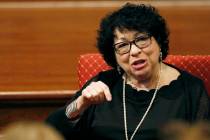Sandoval’s scholarship plan encourages competition
Well-to-do parents have always had school choice, and they always will. They can afford to pay high mortgages and school taxes involved for the best district schools, or even to pay all of this in addition to private school tuition.
Thoughtful public policy can expand parental choice to the rest of Nevada’s families and improve school districts in the process.
Nevada public education needs deep, systemic reform. The Nation’s Report Card shows only 26 percent of Nevada students scored proficient in eighth-grade reading in 2011. In addition, the Census Bureau projects the number of school-age children in Nevada will more than double by 2030. Nevada needs more schools, and it needs more effective schools. And soon.
Private school choice and a more robust community of high-quality public charter schools would lead toward improved student outcomes while relieving district overcrowding. Gov. Brian Sandoval recognizes the challenges before the state’s school system. A longtime supporter of public charter schools and school choice, he has proposed an innovative Educational Choice Scholarship Program — Senate Bill 445 — which would help inject immediate improvement into the system as a whole and provide a lifeline for students whose educational needs are not being met.
Charter schools — independent public schools funded by the state entirely on a per-student basis — create diverse offerings and educational approaches. Tuition tax credit programs, such as Gov. Sandoval’s scholarship proposal, accomplish the same goal by putting private schools within the reach of middle- and lower-income families. Every child learns differently, and both of these policies help to create options, empowering parents to choose the school that best meets the needs of their children.
The public school system must do more than educate a small minority of students to internationally competitive levels. Nevada’s future — like that of the country as a whole — depends upon its ability to prepare all students to survive and thrive in a competitive world.
All forms of school choice will help relieve school district overcrowding. School districts are struggling to keep up with enrollment growth and are drawing resources out of the classroom to service buildings.
A 2008 analysis found that Nevada’s public school spending for capital outlay in 2003 was more than 40 percent higher than the national average on a per-pupil basis. School debt per pupil was also more than 60 percent higher than the national average.
A comparison between Nevada and neighboring Arizona proves that there are solutions to the quantity and quality problems. Like Nevada, Arizona’s surging population has required a large increase in the number of schools. Unlike Nevada, Arizona has embraced tuition tax credits and a robust charter school law.
Unlike Nevada, Arizona kept capital costs below the national average, largely because of its embrace of parental choice in education. Choice options have reduced the need for Arizona’s school districts to incur debt in the process of absorbing the increase in the student population. Today, Arizona has 539 public charter schools educating more than 136,000 children, with tuition tax credits assisting an additional 29,000 students. Nevada, meanwhile, has only 34 public charter schools educating 13,000 students — and zero private choice assistance.
Florida has the nation’s largest tuition tax credit program, which educates more than 51,000 students. The tax credit program is itself part of a broad array of public and private K-12 options in the Sunshine State that also include charter schools, school vouchers, open enrollment, dual college enrollment, magnet schools, digital learning and home schooling.
In the 2011-12 school year, 43 percent of Florida students experienced school at least partially outside their zoned district school. Rather than wilting under the pressure, Florida district schools improved substantially as a result of reform: NAEP scores, high school graduation and Advanced Placement exams are up, while dropouts and college remediation rates have fallen.
Parental choice should not be the only strategy employed to fix public education in Nevada, but these policies do represent an irreplaceable source of improvement.
A decentralized process of parents judging schools, with public funding following the child, cannot be replicated by top-down policies. Nevada lawmakers considering legislation to improve the Silver State’s parental choice environment should recognize the enormous opportunity in diversifying schooling.
Jeb Bush was governor of Florida from 1999 to 2007 and is chairman of the Foundation for Excellence in Education.























